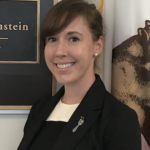With multiple healthcare policy issues and key legislation currently under consideration, the ACR’s Government Affairs Committee (GAC) is facing several challenges in coming years. Incoming GAC Chair Elizabeth (Blair) Solow, MD, an assistant professor of medicine in the Division of Rheumatic Diseases at UT Southwestern Medical Center in Dallas, shared with The Rheumatologist some of her goals for leading the committee.

Dr. Blair Solow
The Rheumatologist (TR): Why were you interested in becoming chair of the GAC?
Dr. Solow: I believe we have a role to play as physicians and rheumatology providers to speak out on how policies affect our patients and our practice. I am honored to be taking on this position in which experienced physician leaders before me have made tremendous strides in implementing policies that positively impact our patients and practice.
TR: What previous work had you done related to this committee or other ACR committees?
Dr. Solow: I have been a member of the Committee on Rheumatologic Care (CORC) for two years now and served as the liaison to GAC and the Annual Meeting Planning Committee (AMPC). Led by Colin Edgerton, MD, FACP, RhMSUS, CORC deals with practice issues and provides a sounding board for members to voice their concerns about the practice of rheumatology.
Prior to serving on CORC, I was a member of GAC for three years under the leadership of Drs. Will Harvey, MD, MSc, FACR, and Angus Worthing, MD, FACR, FACP. During my tenure on GAC, I worked with Sarah Doaty, MD, and Christina Downey, MD, to develop an advocacy program called Advocacy 101 for ACR fellows and program directors. This program brings members to Capitol Hill for a day of learning about health policy and a day of advocating on the Hill. I am proud that this program is in its fifth year.
Serving as CORC’s liaison (and previously GAC’s liaison) to the AMPC also helped me learn about how the Annual Meeting is created and how members want to hear content regarding health policy and practice issues. Our ACR/ARP members want to know how to practice effective and quality-driven medicine, and these committees as well as the Annual Meeting help ensure the health of the rheumatology practice.
TR: What are the biggest challenges right now for rheumatologists related to government affairs?
Dr. Solow: The greatest challenge is increasing awareness among providers that our voice in public policy is crucial to the success of our practice. For example, the medications that we prescribe are some of the most expensive nationally, and government policy directly impacts our ability to prescribe and our patients’ ability to obtain these medications. Additionally, utilization management policies burden our providers and contribute to burnout, create a drain on resources and result in barriers to providing efficient patient care. We need to advance policies that enable, not hinder, physicians taking care of their patients. Moreover, we cannot afford provider burnout as the workforce shortage in rheumatology is a looming issue that demands our attention.



